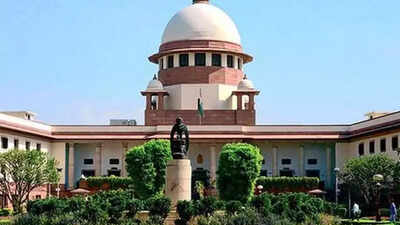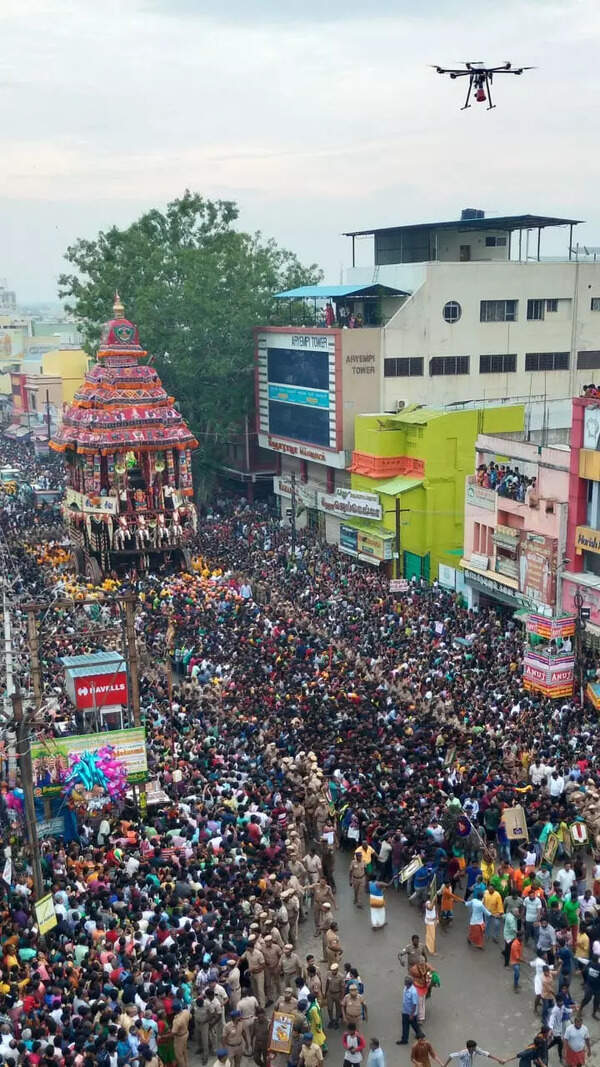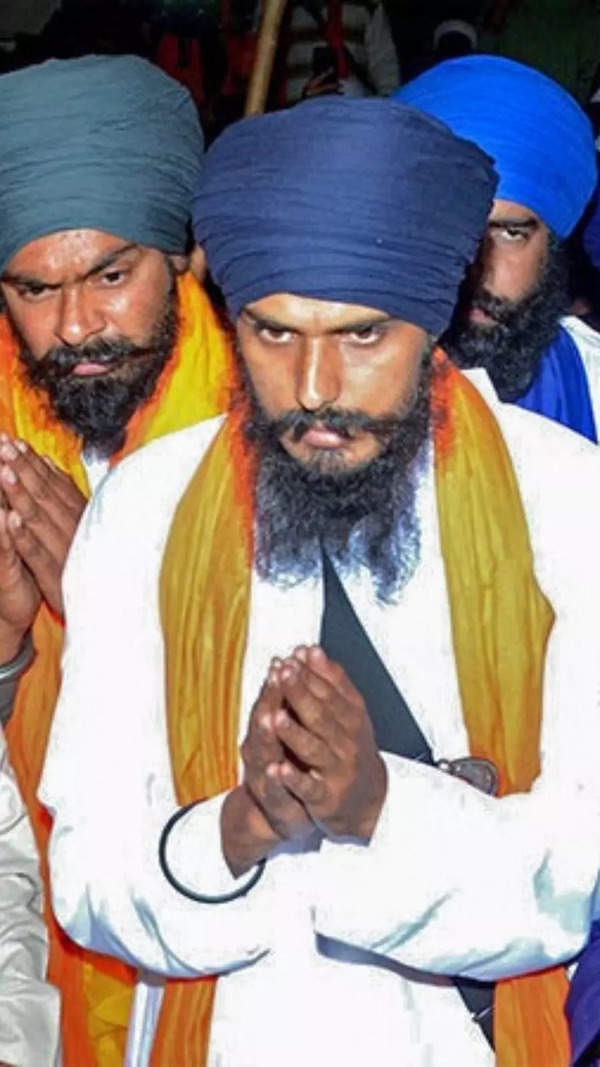- News
- City News
- delhi News
- Lieutenant governor must abide by aid & advice of Delhi govt: SC
Lieutenant governor must abide by aid & advice of Delhi govt: SC

The SC said the elected government in Delhi has power to take decisions on all issues relating to the state list, which are in its legislative and executive domain (File photo)
NEW DELHI: The Supreme Court on Thursday reaffirmed that the lieutenant governor, as the representative of the Union government, is bound by the aid and advice of the council of ministers headed by the chief minister and ruled that he cannot act on his own in matters relating to transfer and posting of bureaucrats in Delhi.
The AAP government had questioned the May 21, 2015, notification of the ministry of home affairs, which had said, "The lieutenant governor of the National Capital Territory of Delhi may, in his discretion, obtain views of the chief minister of the NCTD in regard to the matter of 'services' wherever he deems it appropriate." This had given the LG a lot of ground to play with, much to the chagrin of the Delhi government with regard to posting of bureaucrats and their accountability.

"We reiterate that in light of Article 239AA and the 2018 constitution bench judgment, the lieutenant governor is bound by the aid and advice of the council of ministers of NCTD in relation to matters within the legislative scope of NCTD," a five-judge bench of CJI D Y Chandrachud and Justices M R Shah, Krishna Murari, Hima Kohli and P S Narasimha said.
"As we have held that NCTD has legislative power over 'services' (excluding 'public order', 'police' and 'land') under Entry 41 in List II, the lieutenant governor shall be bound by the decisions of GNCTD on services, as explained above," the bench said, snuffing out any assumed control of the LG over posting or transfer of bureaucrats deputed to work under the Delhi government. It also said the LG could not refer every matter to the President.
Writing the judgment, the CJI said, "The LG may act in his discretion only in two classes of matters: one, where the matter deals with issues which are beyond the powers of the legislative assembly and where the President has delegated the powers and functions to the LG in relation to such matter; and secondly, matters which by law require him to act in his discretion or where he is exercising judicial or quasi-judicial functions."
The SC said the elected government in Delhi has power to take decisions on all issues relating to the state list, which are in its legislative and executive domain. "The LG may request the minister or the council of ministers to reconsider its decision. It is only if difference persists even after attempts at resolution that he may refer the matter to the President, and await the decision," it said.
Foraying into the field of federalism and the peculiar socio-cultural composition of India, the bench made several general remarks that would gladden states governed by non-BJP parties or coalitions, which accuse the Union government of routinely interfering in their affairs.
The CJI said, "Principle of democracy and federalism are essential features of our Constitution and form part of the basic structure. Federalism in a multi-cultural, multi-religious, multi-ethnic and multi-linguistic country like India ensures representation of diverse interests. It is a means to reconcile the desire of commonality along with desire for autonomy and accommodate diverse needs in a pluralistic society. Recognising regional aspirations strengthens the unity of the country and embodies the spirit of democracy.
"Thus, in a dual polity, two sets of government, one at the national and second at the level of regional federal units. These dual seats of government, elected by we the people in two separate electoral processes, is a dual manifestation of public will. The priorities of these two sets of government, which manifest in a federal system, are not just bound to be different but are intended to be different."
The SC said the executive power of the Union in a state, over matters on which both Union and state can legislate (List 3 or Concurrent List), is limited by the provisions of the Constitution to ensure that governance of states is not taken over by the Union as that would completely abrogate the federal system of governance and the principles of representative democracy.
"It is with this objective in mind that the members of the Constituent Assembly thought it fit to limit the Union's executive power in a state over matters on which the state legislature also has legislative competence," it said.
The AAP government had questioned the May 21, 2015, notification of the ministry of home affairs, which had said, "The lieutenant governor of the National Capital Territory of Delhi may, in his discretion, obtain views of the chief minister of the NCTD in regard to the matter of 'services' wherever he deems it appropriate." This had given the LG a lot of ground to play with, much to the chagrin of the Delhi government with regard to posting of bureaucrats and their accountability.

"We reiterate that in light of Article 239AA and the 2018 constitution bench judgment, the lieutenant governor is bound by the aid and advice of the council of ministers of NCTD in relation to matters within the legislative scope of NCTD," a five-judge bench of CJI D Y Chandrachud and Justices M R Shah, Krishna Murari, Hima Kohli and P S Narasimha said.
"As we have held that NCTD has legislative power over 'services' (excluding 'public order', 'police' and 'land') under Entry 41 in List II, the lieutenant governor shall be bound by the decisions of GNCTD on services, as explained above," the bench said, snuffing out any assumed control of the LG over posting or transfer of bureaucrats deputed to work under the Delhi government. It also said the LG could not refer every matter to the President.
Writing the judgment, the CJI said, "The LG may act in his discretion only in two classes of matters: one, where the matter deals with issues which are beyond the powers of the legislative assembly and where the President has delegated the powers and functions to the LG in relation to such matter; and secondly, matters which by law require him to act in his discretion or where he is exercising judicial or quasi-judicial functions."
The SC said the elected government in Delhi has power to take decisions on all issues relating to the state list, which are in its legislative and executive domain. "The LG may request the minister or the council of ministers to reconsider its decision. It is only if difference persists even after attempts at resolution that he may refer the matter to the President, and await the decision," it said.
Foraying into the field of federalism and the peculiar socio-cultural composition of India, the bench made several general remarks that would gladden states governed by non-BJP parties or coalitions, which accuse the Union government of routinely interfering in their affairs.
The CJI said, "Principle of democracy and federalism are essential features of our Constitution and form part of the basic structure. Federalism in a multi-cultural, multi-religious, multi-ethnic and multi-linguistic country like India ensures representation of diverse interests. It is a means to reconcile the desire of commonality along with desire for autonomy and accommodate diverse needs in a pluralistic society. Recognising regional aspirations strengthens the unity of the country and embodies the spirit of democracy.
"Thus, in a dual polity, two sets of government, one at the national and second at the level of regional federal units. These dual seats of government, elected by we the people in two separate electoral processes, is a dual manifestation of public will. The priorities of these two sets of government, which manifest in a federal system, are not just bound to be different but are intended to be different."
The SC said the executive power of the Union in a state, over matters on which both Union and state can legislate (List 3 or Concurrent List), is limited by the provisions of the Constitution to ensure that governance of states is not taken over by the Union as that would completely abrogate the federal system of governance and the principles of representative democracy.
"It is with this objective in mind that the members of the Constituent Assembly thought it fit to limit the Union's executive power in a state over matters on which the state legislature also has legislative competence," it said.
Start a Conversation
FOLLOW US ON SOCIAL MEDIA
FacebookTwitterInstagramKOO APPYOUTUBE










